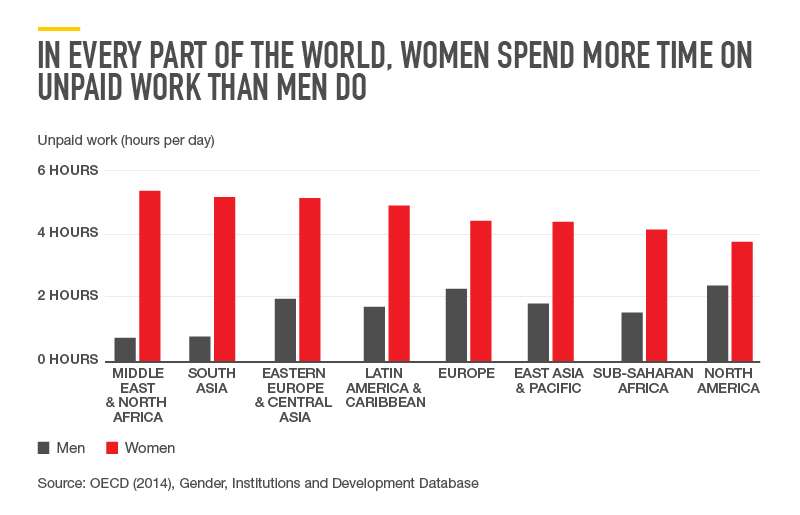North America Has the Smallest Unpaid-Labor Gap Between Men and Women Worldwide
Melinda Gates calls on teens to close the unpaid-work gap globally via entrepreneurship and technological innovation.

In Melinda Gates' section of the annual letter from her and Bill's eponymous foundation, she calls on today's teenagers and young people to close the global gender gap in unpaid labor. When it comes to cleaning, cooking, childcare, and other caregiving tasks, women's work far outpaces men's around the world.
"This holds true in every single country," Gates notes. "Globally, women spend an average of 4.5 hours a day on unpaid work. Men spend less than half that much time. But the fact is that the burden of unpaid work falls heaviest on women in poor countries, where the hours are longer and the gap between women and men is wider. In India, to take one example, women spend about 6 hours, and men spend less than 1 hour."
The positive news, from an American perspective, is that men and women in North America face the lowest level of unpaid-labor disparity globally:

Housework inequity may be an odd topic choice for a global philanthropic maven (I admit, I was skeptical going in), but Gates' preferred solutions largely lie in capitalism, private philanthropy, and technological progress—a refreshingly forward-looking and empowering message in what seems like a sea of blame-casting and calls for government meddling on subjects like these. "I'm writing this because I'm optimistic," insists Gates. "Though no country has gotten the balance perfect yet, many have narrowed the unpaid labor gap by several hours a day. America and Europe have come a long way."
While Gates does delve into cultural norm changes, her cheerleading seems more firmly for time-saving technology and entrepreneurship that brings better, cheaper choices and devices to the world's poor. "Rich countries have done a great job of (reducing) the time it takes to do most household tasks," Gates writes.
Americans don't fetch water because faucets fetch it for us, instantly. We don't spend all day on a load of laundry because the washing machine does it in a half-hour. Cooking goes much faster when you start with a gas stove instead of an ax and a tree.
[…] The solution is innovation, and you can help. Some of you will become engineers, entrepreneurs, scientists, and software developers. I invite you to take on the challenge of serving the poor with cheap, clean energy, better roads, and running water. Or maybe you can invent ingenious labor-saving technologies. Can you imagine a machine that washes clothes using no electricity and very little water? Perhaps you can improve on the mortar and pestle, the 40,000-year-old technology I see women using to grind grain into food every time I travel in sub-Saharan Africa or South Asia.
Gates' reasons for caring about the issue are also rooted in raising people out of poverty through entrepreneurship. "It's not just about fairness," she writes.
Assigning most unpaid work to women harms everyone: men, women, boys, and girls. The reason? Economists call it opportunity cost: the other things women could be doing if they didn't spend so much time on mundane tasks. What amazing goals would you accomplish with an extra hour every day? Or, in the case of girls in many poor countries, an extra five or more? There are lots of ways to answer this question, but it's obvious that many women would spend more time doing paid work, starting businesses, or otherwise contributing to the economic well-being of societies around the world. The fact that they can't holds their families and communities back.


Show Comments (193)